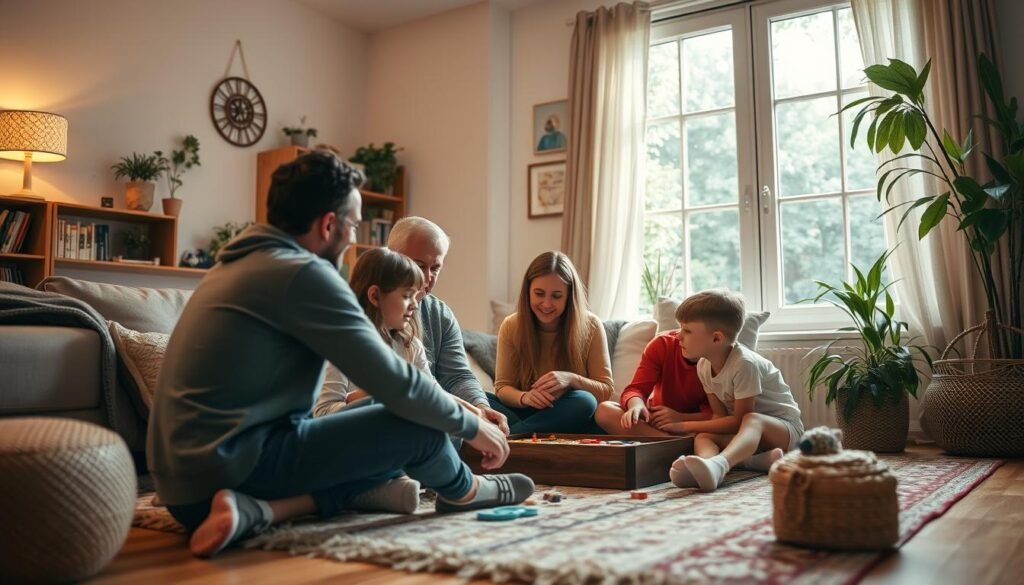“The quality of your life is the quality of your relationships.” – Tony Robbins
Healthy relationships are key to a happy life. They give us a sense of belonging and emotional support. They also help us understand ourselves and others better.
In this guide, we’ll cover the basics of building strong relationships. We’ll talk about how to communicate well, solve conflicts, and build trust. We’ll also share tips on emotional intelligence, respect, and empathy.
Key Takeaways
- Effective communication is the foundation of healthy relationships.
- Developing emotional intelligence and empathy can deepen your connections.
- Mutual respect and understanding are essential for maintaining trust and intimacy.
- Compromise and flexibility are necessary for navigating changes and transitions.
- Seeking professional support can help you address complex relationship challenges.
The Importance of Open and Honest Communication
Good communication is key to a healthy relationship. It helps us connect better with our partners. We’ll look at how to listen well and share our feelings and needs.
Effective Listening Skills
Listening actively means more than just hearing words. It’s about understanding our partner’s feelings and what they really mean. This way, we can respond with care and understanding.
Expressing Feelings and Needs
It’s also crucial to share our own feelings and needs clearly. Using “I” statements helps us express without blaming. This builds trust and opens up deeper conversations.
When we listen well and share openly, we create a safe space. This improves our communication skills and emotional intelligence. It makes our relationship more rewarding.
“The greatest gift you can give another is the purity of your attention.” – Richard Moss
Developing these communication skills lays a strong foundation. It helps us understand and care for each other better, throughout our journey together.
Building healthy relationships
Building strong relationships is key to a happy life. At the core are mutual respect, clear personal boundaries, and a shared goal to understand each other. These elements help us create bonds that make life richer and bring us closer to those we love.
Good communication is vital in any relationship. It means listening to understand and expressing ourselves well. When we truly listen, we build trust, intimacy, and respect.
Setting and respecting personal boundaries is also crucial. Healthy relationships allow us to feel safe and be ourselves. By honoring our and others’ boundaries, we foster a supportive environment where everyone’s needs are valued.

“The greatest weapon against stress is our ability to choose one thought over another.” – William James
Building healthy relationships is a lifelong journey. It takes patience, compromise, and a desire to grow together. By focusing on these key aspects, we build lasting, fulfilling connections with those we care about.
Understanding and Resolving Conflicts
Conflict is a normal part of any relationship. How we deal with it can greatly affect our connection’s strength and length. At the core of solving conflicts is emotional intelligence and finding compromise.
When we disagree, starting with empathy and understanding is key. Listening to our partner and acknowledging their feelings helps us find the conflict’s root. This creates a respectful and open space for talking things through.
- Identify the core issues at hand, looking beyond the surface-level symptoms.
- Communicate your own needs and concerns in a clear, non-confrontational manner.
- Seek common ground and areas of agreement, rather than focusing solely on the differences.
- Explore creative solutions that address the underlying interests of both parties.
- Be willing to compromise and make concessions, without compromising your core values.
“The ability to compromise is not an indication of weakness, but of strength and maturity.”
Using emotional intelligence helps us handle conflicts with kindness and clarity. It means knowing our feelings and our partner’s, and responding with empathy. By looking for compromise and working together, we can come out of conflicts stronger and closer.
The secret to handling conflicts well is good communication, emotional smarts, and finding solutions that work for both. By facing conflicts openly and working together, we can grow closer, build trust, and create a strong relationship.
Fostering Trust and Intimacy
Building lasting relationships is more than just talking things out and solving problems. It’s about creating a deep trust and intimacy. This is what makes connections truly meaningful, where we feel safe to share our true selves.
Vulnerability and Emotional Intimacy
Vulnerability is crucial for emotional closeness. It takes bravery to share our deepest fears and dreams with someone. But when we do, it builds a strong connection and a sense of belonging.
Being open and honest about our feelings helps us build trust and understanding. It’s a step towards deeper connections with others.
Physical Intimacy and Boundaries
Physical closeness is also key in building trust and closeness. Yet, it’s vital to respect each other’s boundaries and comfort levels. Talking openly about our needs and desires helps us find a balance that makes both partners feel respected and happy.
To build trust and intimacy, we must be willing to be vulnerable and open. We must respect each other’s boundaries. By doing so, we lay a strong foundation for our relationships to grow and thrive through life’s challenges.

“The greatest gift we can give one another is the gift of trust and intimacy.” – Brene Brown
Developing Emotional Intelligence
Emotional intelligence helps us understand and manage our feelings and those of others. It’s key for healthy relationships. By being empathetic and understanding, we can make our connections stronger.
Empathy and Understanding
Empathy lets us share and understand another’s feelings. When we see things from our partner’s view, we learn a lot. This helps us talk better, solve problems with kindness, and grow closer.
- Actively listen to your partner, seeking to understand their emotions and experiences.
- Validate their feelings, even if you don’t initially agree with their point of view.
- Communicate with empathy, using “I” statements to express your own emotions and needs.
Knowing ourselves is also important. By understanding our emotions, we can handle relationships better. This self-awareness helps us stay calm, manage our feelings, and face problems with a clear mind.
| Skill | Description | Benefits |
|---|---|---|
| Empathy | The ability to understand and share the feelings of another | Improved communication, conflict resolution, and emotional bonding |
| Self-Awareness | Understanding our own emotional triggers, strengths, and weaknesses | Enhanced emotional regulation and a more balanced approach to relationships |
By growing our emotional intelligence, we can make our relationships deeper. We’ll face challenges better and build lasting bonds.
“Empathy is about finding echoes of another person in yourself.” – Mohsin Hamid
Respecting Personal Boundaries
Keeping healthy personal boundaries is key for mutual respect and everyone’s well-being in a relationship. Respecting each other’s personal boundaries builds trust, understanding, and emotional safety.
Clear communication is crucial for respecting personal boundaries. We should talk openly about our needs, likes, and comfort levels with our partners. This way, we can set reasonable expectations and prevent misunderstandings that might cause conflicts.
- Identify your personal boundaries and communicate them respectfully.
- Be mindful of your partner’s boundaries and respect them without judgment.
- Discuss any changes or adjustments to boundaries as your relationship evolves.
Mutual respect is also vital. We should respect each other’s boundaries, even if they’re different from ours. This creates a safe and trusted environment, making both partners feel respected and valued.
| Healthy Boundary Practices | Unhealthy Boundary Practices |
|---|---|
| Communicating needs and preferences | Ignoring or dismissing partner’s boundaries |
| Respecting each other’s personal space | Invading personal space without consent |
| Honoring privacy and independence | Excessive control or demands |
By focusing on personal boundaries and mutual respect, we can create strong, fulfilling relationships. These relationships empower us to grow and thrive as individuals while strengthening our bond as partners.

Cultivating Mutual Respect and Appreciation
Building healthy relationships starts with mutual respect and appreciation. When we value each other’s unique views and contributions, trust and connection grow. This creates a strong bond between us.
Active listening is key to respect. It shows we care about what others think and feel. This leads to deeper conversations and understanding.
- Practice active listening by maintaining eye contact, rephrasing what the other person says, and asking clarifying questions.
- Actively seek to understand your partner’s or friend’s point of view, even if it differs from your own.
- Express appreciation for the efforts, skills, and qualities that your loved ones bring to the relationship.
Appreciation is just as vital. Recognizing others’ efforts and strengths boosts our relationships. A simple “thank you” or compliment can make a big difference.
| Mutual Respect | Mutual Appreciation |
|---|---|
| Active listening | Expressing gratitude |
| Seeking to understand different perspectives | Recognizing unique contributions |
| Valuing each other’s experiences and opinions | Celebrating small victories and achievements |
By focusing on mutual respect and appreciation, we build strong, lasting relationships. This approach not only strengthens our bonds but also prepares us for a lifetime of healthy relationships based on mutual respect and appreciation.
“Mutual respect is the foundation of genuine and lasting relationships. It’s not just about what we can get, but about what we can give and how we can uplift one another.”
The Role of Compromise and Flexibility
Relationships need a balance of compromise and flexibility. Finding common ground is key when we disagree. By being flexible and compromising, we build a stronger relationship and understand each other better.
Finding Common Ground
Compromise isn’t about always giving in. It’s about finding a middle ground where both sides feel heard. Flexibility helps us adapt and find solutions that work for everyone.
When conflicts arise, it’s important to listen and be open-minded. By understanding each other’s needs, we can find common ground and solve problems together.
- Listen to your partner without interrupting or judging.
- Focus on the main issues, not the small details.
- Think of many solutions that meet both of your needs.
- Be ready to find a middle ground that works for both.
- Stay flexible and open to new ideas and changes.
By embracing compromise and flexibility, we can overcome conflicts and strengthen our bond. This builds trust and intimacy, helping our relationships grow and change over time.
| Compromise | Flexibility |
|---|---|
| Finding a middle ground where both parties feel heard and respected | Adapting to changing circumstances and finding creative solutions |
| Ensuring that no one feels they are constantly sacrificing their needs | Allowing the relationship to grow and evolve over time |
| Facilitating mutual understanding and a sense of fairness | Fostering a willingness to experiment and try new approaches |
By being open to compromise and flexibility, we can handle conflicts and find common ground. This strengthens our bond and benefits us both.
“The greatest gift you can give another is the purity of your attention.” – Richard Moss

Building a Foundation of Commitment and Loyalty
Commitment and loyalty are key to a healthy relationship. They bring security, trust, and a long-term focus on success. These qualities help us build a strong base that can handle life’s ups and downs.
Clear, open communication is crucial for commitment. We must talk honestly about our needs and expectations. This ensures we’re working towards the same goals. Good communication helps us solve problems together.
Loyalty shows in our actions. It means supporting our partner through tough times and putting the relationship first. By being loyal, we show our partner they can count on us, no matter what.
| Factors Strengthening Commitment | Factors Strengthening Loyalty |
|---|---|
|
|
By focusing on commitment and loyalty, we build a strong, fulfilling relationship. This foundation helps our relationship grow and thrive.
“Commitment is the glue that holds a relationship together, and loyalty is the bedrock upon which that commitment is built.”
Remember, commitment and loyalty need constant care and attention. By always prioritizing these, we build a lasting bond that can endure through time.
Creating Quality Time Together
In the pursuit of nurturing healthy relationships, dedicating quality time to our partners is key. By setting aside moments to connect, we build a strong bond. This closeness brings us joy and fulfillment.
Planning regular date nights or weekend getaways is a great way to spend quality time. These activities help us focus on each other, away from daily life’s distractions. Whether it’s a romantic dinner or a weekend trip, these moments deepen our understanding and appreciation for each other.
We can also add quality time to our daily routines. Simple actions like going for a walk, enjoying coffee together, or having deep conversations can strengthen our healthy relationships.
- Prioritize regular date nights or weekend getaways to intentionally connect with your partner.
- Incorporate quality time into your daily routines through simple activities like taking a walk, sharing a meal, or having uninterrupted conversations.
- Embrace technology-free zones during your time together to minimize distractions and foster deeper engagement.
| Activity | Benefits |
|---|---|
| Cooking a Meal Together | Enhances cooperation, communication, and shared accomplishment. |
| Exploring a New Hobby | Fosters a sense of adventure, shared interests, and learning together. |
| Volunteering in the Community | Promotes a shared sense of purpose, empathy, and social engagement. |
By making quality time a priority, we can strengthen our emotional bonds. These shared moments not only bring us closer but also create lasting memories and a deep sense of fulfillment.

“The best thing about the future is that it comes one day at a time.” – Abraham Lincoln
Nurturing Individual Growth and Personal Space
Building healthy relationships means valuing individual growth and personal space. Our bond with our partner brings joy and support. Yet, it’s key that we each grow as unique individuals.
Balancing Togetherness and Independence
Open communication and mutual respect are crucial for balance. We need a safe space to share our desires for individual growth and personal space without fear.
Embracing independence and respecting each other’s freedom makes our bond strong and healthy. This balance lets us grow together while also nurturing our personal growth.
- Communicate your needs for personal time and space openly and respectfully
- Encourage each other’s hobbies, interests, and personal pursuits
- Celebrate each other’s accomplishments and support individual growth
- Maintain a sense of individuality within the relationship
- Regularly check in with each other to ensure both partners’ needs are being met
“The best relationships are those where two people come together to support each other’s individual growth, not to complete or control each other.”
Nurturing individual growth and personal space in our relationships leads to a deep connection. This balance is the key to a fulfilling, healthy relationship that lets us thrive as individuals and as a couple.
Navigating Changes and Transitions
Relationships are always changing. Dealing with changes and transitions can be tough. But, with the right approach, we can keep our relationships strong and happy.
Open and honest talk is key. We should often check in with our partners and talk about our changing needs. Good communication means listening well, understanding each other, and finding common ground.
Being flexible and adaptable is also important. We need to be ready to adjust our plans and try new things together. Seeing transitions as chances for growth helps us stay positive.
- Communicate openly and honestly about changing needs and priorities
- Practice active listening and seek to understand each other’s perspectives
- Embrace flexibility and adaptability in the face of changes
- Seek support from friends, family, or professionals when needed
- Celebrate the new opportunities that transitions can bring
| Coping with Changes | Embracing Transitions |
|---|---|
| Acknowledge and validate feelings | Maintain a positive mindset |
| Develop a plan for adapting | Explore new experiences together |
| Lean on your support system | Focus on the growth opportunities |
By facing changes and transitions with care and flexibility, we can make our relationships stronger. We become more resilient and closer than ever.
“The only constant in life is change. The challenge is to not fear it, but to embrace it.”

Seeking Professional Support When Needed
Building healthy relationships is rewarding, but sometimes we need help. Professional guidance, like counseling, can be very useful. It offers tools and insights to strengthen our bonds.
Professional support helps with many relationship issues. It can improve communication and intimacy. A trained therapist can give us new ideas and strategies to overcome challenges.
Knowing when to seek help is key. Look for signs like constant arguing or feeling disconnected. Major life changes, like getting married or having a child, also need professional advice.
- Identifying relationship challenges that may require professional support
- Exploring the benefits of counseling or therapy for building professional support
- Selecting a qualified therapist or counselor who aligns with your needs and values
- Developing a plan to incorporate professional guidance into your relationship-building journey
Recognizing the need for professional support and seeking it can help. It strengthens our ability to handle relationship complexities. This way, we can build the meaningful connections we want.
| Signs It’s Time to Seek Professional Support | Benefits of Professional Guidance |
|---|---|
|
|
“Seeking professional support is a sign of strength, not weakness. It demonstrates a commitment to personal growth and a desire to build stronger, more fulfilling relationships.”
Working together: The 4 dimensions of interpersonal relationships
Working together: The 4 dimensions of interpersonal relationships
Conclusion
We’ve looked at key steps to build and keep healthy relationships. Learning effective communication skills and emotional intelligence is vital. These help create strong, lasting bonds.
It’s also important to respect each other’s boundaries and show mutual respect. Being loyal and willing to compromise helps through tough times. Being flexible and seeking help when needed also strengthens our relationships.
Remember, building healthy relationships is a journey that never ends. It takes effort, understanding, and a desire to grow together. By following these principles, we can create connections that make our lives better and improve our well-being.
